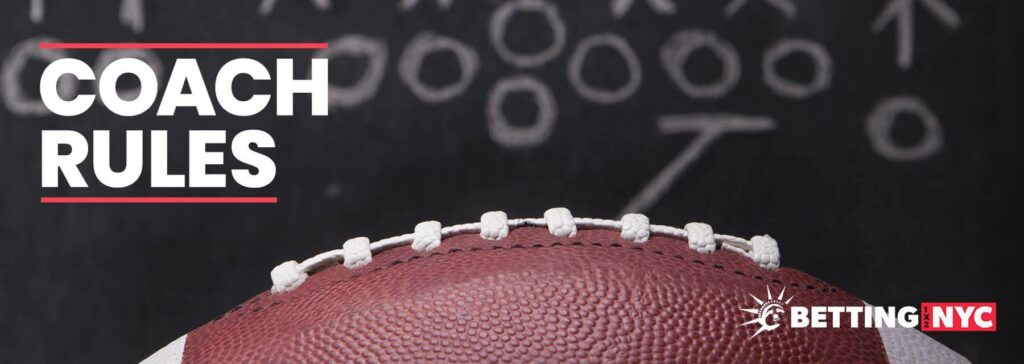Learn the NFL Rules & Bet Smarter

Following the NFL games, understanding the rules, and knowing how teams are expected to react to certain plays will benefit you in the long run.
To pick more winning bets and boost your profits when betting on the NFL, knowledge is everything, no matter the sport you bet on.
Our NFL specialists know a thing or two about the game and how these NFL rules relate to profitable betting. We have a detailed guide on the NFL odds and teams, but if you want the full rundown on the rules, keep reading.
NFL Rules – The Aim of the Game
NFL rules can be difficult to understand, from the first whistle to the NFL playoff overtime rules. At its most fundamental level, the game is measured in yards.
Each side has four opportunities known as ‘downs’ to advance the ball by at least 10 yards towards their opponent’s goal line.
When a team advances by 10 yards, the ‘downs’ begin again. If the team does not advance 10 yards after four ‘downs’, the ball is turned over to the opposing team. Two common strategies are used by teams just before the fourth down:
- Go for a field goal.
- Kick the ball downfield.
Each team aims to move downfield, with the main objective being to rack up points. To score a touchdown in football, the team must advance the ball down the field and into the end zone.
The best approach to scoring is for the quarterback to find a receiver downfield with a long pass. The running back could also carry the ball across the goal line while being shielded by the fullback as he moves downfield.
The game can go to extra time, which is when various NFL overtime rules come into play – more on that shortly, but first, the playing field and team roles.
Playing Field, Player Roles & Scoring Points
NFL rules dictate that a standard field is 100 yards in length. The ‘endzone’ refers to the 10-yard area at either end of the field. Touchdowns can be scored within the ‘endzone’. Additionally, there are the goalposts that kickers aim at while attempting to score.
Player Roles – Offensive
Most team positions are attack or defense. The offense’s purpose is to control the ball, advance it, and score – they do this by making a touchdown or a field goal.
- Quarterback – directs the play and makes the tactical moves to score points.
- Center – the player that sends the ball back through to the QB.
- Fullback – defends the running back and protects the QB.
- Running back – the main runners who carry the ball downfield.
- Tight end – acts as a blocker and receiver on either side of the quarterback.
- Wide receivers – the fastest players that catch the ball downfield.
- Right/Left guards – the inner guard of the offensive line protecting the QB.
- Right/Left tackles – the outer guard of the offensive line.
Player Roles – Defensive

The defense is equally crucial to preventing goals. They aim to catch thrown balls and must also tackle the offense to stop the opposing team from advancing.
- Defensive tackle – stopping the runner’s plays and disrupting the QB.
- Defensive end – tackle runners and/or QB and pushing opponents off the field.
- Linebacker – key tacklers that take up the role of defending passes and runs.
- Safety – the last line in defense that defends all deep runs and passes.
- Cornerback – take up wide positions opposite the wide receivers.
How to Score
According to NFL rules, there are a number of methods to score, and each method is worth a different amount.
- A touchdown in the end zone, whether carried or caught, earns six points.
After scoring a touchdown, a team can choose between two options for scoring extra points.
- A one-point conversion kick is the first play.
- The second play is a two-point conversion attempt.
“Teams can also kick a field goal for three points on a fourth down in the opponent’s territory.”
Game Duration, Time Limits & NFL Playoff Overtime Rules
Typically, an NFL game will go on for 60 minutes. There are four 15-minute halves throughout the game. Yet, things become more difficult if we consider a situation in which the score is tied at the end of the first 60 minutes.
You should also be aware that the NFL playoff overtime rules change from the regular season to the postseason.
Regular Season – NFL Overtime Rules
Matchups during the regular season come with more lenient NFL OT rules due to there being less on the line than in the playoffs. Typically, here is what you can expect:
- Coin toss for ball possession
- 10-minute period
- Sudden death gameplay
- 2 x timeouts for each team
- No points after a try
- Tied game if no points after sudden death
- Zero challenges from the coaches
Playoffs – NFL OT Rules
You can expect the rules to become stricter during the NFL playoffs because there is much more on the line for each team. The key differences in the NFL overtime rules include:
- Multiple 10-minute periods until one team wins
- 2-minute intermission between periods
- The team that loses the first coin toss decides who starts with the ball
- 3 x timeouts
- Additional coin tosses after every fourth overtime period
Team & Player Rules
Up to fifty players can be included on a roster for an NFL team, yet only 11 players are allowed on the field at any one time under the current NFL rules. The majority of the active roster consists of both offensive and defensive specialists.
Each player prepares for and plays a unique role in the team. It’s important to note that some roles are more tactical than others. A coach’s tactical approach will dictate when and why these players are substituted in and out of the game.
NFL Coach Rules

On the sidelines, coaches are often involved in more ways than one and must follow a list of official NFL rules. Out of all the rules laid out for coaches, “Challenges” have gained the greatest notoriety.
Each coach gets two challenges, with two successful calls generating a third ‘bonus’ challenge. The head coach must wave a red flag to indicate any challenge.
Disputes often arise about possession and distances, but the ruling of a penalty cannot be contested.
Player Trading Rules
The NFL Draft is the most important time for any team concerning contracts and improving squads. We explain the key areas of the NFL rules during this part of the season:
Eligibility
The NFL enables any player to be traded anytime, regardless of experience (through trade). If his agency included a no-trade clause to his special player contract, this regulation does not apply.
To sign a player with a no-trade clause, the club must gain their approval.
Trading Process
When two clubs agree to transfer a player with a no-trade provision, the player and agent must provide their written approval.
The player may accept the agreement or reject it by invoking the clause. The player may reject the transaction for any reason unless indicated in the clause.
Other Key Trading Points
- Limitations – The “Final Eight Plan” was introduced to help balance the league.
- Waivers – Teams can waive players who can then talk to any team of their choice.
- Player Rights – All salaries, special provisions, obligations, and rights are transferred.
New NFL Rule Changes
As with most sports, the NFL rules have changed significantly over the years. Most of the changes align with game fairness and the general safety of the players in such a high-contact sport.
Video assistance helped to bring more flow to the games, while stricter penalties introduced in 2019 helped to decrease the number of concussions.
Most Recent Updates to NFL Rules
- Practicing squad size increase
- Updated NFL IR protocols
- Free kick formation rule
- Roster cutdown date rules
Other Important NFL Game Rules To Remember
Some of the other key details to remember when betting on the NFL include equipment, fouls, and understanding the level of power the referees hold.
Check our quick review of these areas below, and you should then be fully up to date on all the NFL rules.
Equipment
All players must abide by the NFL rules when it comes to kit and equipment. Football boots are the most important aspect of the game’s equipment, followed by official balls. Here is the key list of the equipment outlined by the latest NFL rules:
- Boots
- Helmets/Face Protection
- Shoulder Pads
- Official Team Kit
Fouls & Violations
There are several situations in which a player or team may receive a penalty for bad behavior. Many penalty-worthy violations within the NFL rules are enforced to guarantee player safety and game fairness. The list includes, but is not limited to:
- Offside
- Encroachment
- Holding (Offensive & Defensive)
- Helmet & Face Mask Violations
- Time Wasting
- Roughing Players
Referees & Policies
NFL referees must be highly qualified, have at least five years of minor league or college experience, 15 years of experience in total, and be members of a recognized football organization.
Referees are tasked with keeping order on the field and ensuring teams play by the rules. They also record time, possession, and movement, decide on challenges, and have the power to overrule other officials.